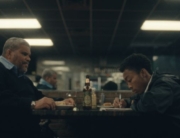Sean Wang’s feature debut Dìdi premiered at this year’s Sundance Film Festival, and it’s a semi-autobiographical coming-of-age story, a genre that’s no stranger to Sundance. While it doesn’t exactly reinvent the wheel, Dìdi stands out among other films of its ilk in its vivid evocation of a specific time period—the summer of 2008—and the wonderfully naturalistic performances Wang elicits from his cast, a mix of veterans and newcomers. Especially impressive are the performances by the luminous Joan Chen and the teenage actor Izaac Wang. They play mother and son, whose relationship is gradually revealed to be the heart of the movie.
Dìdi unfolds mostly through the perspective of Chris Wang (Izaac Wang), a 13-year-old living in Fremont, California, during the summer before he enters high school. (The title is the affectionate nickname given to him by his mother, which means “little brother” in Mandarin.) Chris lives with his mother Chungsing (Joan Chen); his sister, Vivian (Shirley Chen); and his grandmother Nai Nai (Chang Li Hua, the director’s real-life grandmother). Though Chris’s home life is seemingly stable and loving, it’s marred by lots of bickering between Chris and the college-bound Vivian and between Chungsing and her mother-in-law Nai Nai over the latter’s constant criticism of her parenting skills.
Chris’s social anxiety and his awkward attempts to fit in among his peers is a major part of the storyline. This is where Wang’s canny and beautifully observed period details come in, specifically the characters’ online presences. AOL Instant Messenger, the waning days of Myspace, and the emergence of YouTube and Facebook as major internet platforms figure in much of the action, emotional content, and funnier moments.
When Chris falls in with a group of older skateboarders, offering to be their videographer even though he has no experience, he looks to YouTube for suggestions on cool camera angles. After he lands a date with his crush Madi (Mahaela Park), he again consults YouTube for tutorials on how to kiss. He also stalks her Facebook page to get a sense of her likes, and later writes her on AIM that the tearjerker A Walk to Remember is “hella good,” even though he’s never seen a frame of that movie. Major emotional turning points in Chris’s life often hinge on the process of typing, deleting, and sending online messages.
These kinds of sharply observed, specific details make Dìdi such a fun and moving film. In the midst of his film’s nostalgic glow, Wang admirably doesn’t sugarcoat some of the more negative aspects of his protagonist, such as his penchant for saying exactly the wrong thing in social situations and the cruel ways he sometimes treats his mother and sister. (One of the skateboard dudes chides Chris for chasing his mom out of his room when they come over.) In some of the more affecting scenes, Wang broadens his perspective to include Chungsing and her regrets over the path she’s taken in life, choosing to be a wife and mother over fully pursuing her passion for painting.
Dìdi opens with chaotic YouTube footage of a mailbox-exploding prank involving Chris and friends and ends with a shot of Chungsing gazing lovingly on Chris. In between these poles lies a compelling, achingly unresolved, and impressively rendered portrait of youth.







Leave A Comment